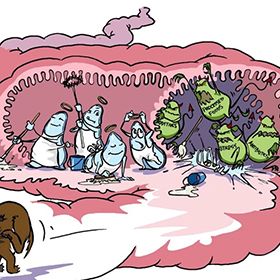
The integrity of our gut and our gut health is so important to our health but has largely been ignored until recently. The mucous membrane absorbs and assimilates foods and serves as a barrier to pathogens and other toxic substances. When this integrity is compromised the permeability of the gut may be altered, gut function erodes and we end up with many health conditions associated with inflammation and leaky gut.
The gut lining is composed of close fitting, thin cells separated by tight junctures, like a thin protein mortar. When the barrier is disrupted the intestines permeability increases allowing larger particles, bacteria, undigested foods or toxins to cross the barrier. This intestinal permeability, called leaky Gut, is linked with virtually all the gut related disorders including ulcerative colitis, Crohn’s disease, celiacs disease, and auto immune conditions including inflammatory joint disease, ankylosing spondylitis, juvenile onset arthritis, psoriatic arthritis, diabetes mellitus type one and primary biliary cirrhosis.
To maintain integrity and normal function of intestine, a delicate equilibrium must be reached between the microbiota and intestinal immune system.[1] In a healthy body the immune system protects us against invasion and controls the commensal microorganisms. In return the beneficial bacteria provide essential nutrients to the gut cells and promote healthy immune responses in the gut.
A healthy microbiome contributes to the maintenance of intestinal epithelium barrier integrity maintaining the tight junctures, promoting intestinal cell repair, and even ensuring a healthy rate of cell turnover. It does this by maintenance of local cell nutrition and circulation and protection against pathogenic microorganisms.
Unlike most other cells in the body that get their energy and nutrients from the blood supply, more than 50% of the energy needs of the small intestine and more than 80% of the energy of the large intestines (where most of our microbiome is) comes directly from the food in the gut. This is not just a one off but with each turning over of gut cells which is over a period of just days, the barrier has to be continually re-established. The end result of this mutually beneficial co-habitation is a symbiotic relationship between the two partners, us and our microbiome. Any change in the relative proportions of the different bacteria alters the subsequent nutrients available and maintenance and protection for the digestive tract. If the right food and conditions are not there for a healthy microbiome then the nutrients are not available for the gut wall and the cells are damaged leading to damage to the integrity of the gut wall and leaky gut. This highlights the importance of eating the right foods for the microbiome to do their job and to maintain optimal gut health.
[1] Magalhaes et al., 2007.